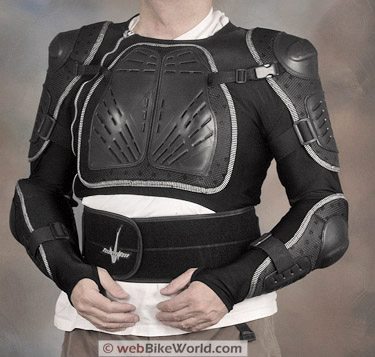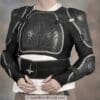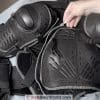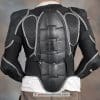It was just about one year ago today that we reviewed the original Velocity Gear “Velocity Armor” shirt (review).
That was a follow-up on a tip from a webBikeWorld visitor.
We’ve been surprised at the response to our motorcycle armor reviews, which have generated considerable interest.
This is a good thing, and it shows that motorcyclists (or at least webBikeWorlders!) are interested in safety and protection.
Velocity Gear is a relatively small distributor and retailer of motorcycle apparel.
In addition to the leather gloves we reviewed last year (see our review of the Velocity Gear F9 and S1 Gloves) and the original armored shirt, they now offer an interesting variety of leather and Cordura motorcycle riding suits and jackets.
Also an expanded line of gloves, including winter and waterproof versions, at reasonable prices.
The folks at Velocity Gear recently sent us their new “Juggernaut” armored shirt, which is an updated version of the original Velocity Armor shirt.
The company claims to offer “the lowest cost Level 2 (verifiable) armor in the world European tested and approved”.
And at $179.00, they’re probably right. This has to be the best protection you can find for the money.
There’s a lengthy discussion of armor and the European CE-approval standards on the Velocity Gear website, which tries to make sense of the rather confusing and technical issues surrounding the testing and safety standards for motorcycle protective gear.
“It is important”, according to Velocity Gear, “that consumers verify each product with the correct standard numbers; otherwise, consumers may be confused regarding what certification level the product is that they are purchasing, or may be purchasing outdated or obsolete items.”
Unfortunately, this is easier said than done!
Part of the problem, at least for the physics-averse, is the obscure (to the lay person anyway) metrics used to describe the differences in the standards.
How many motorcycle riders — or anyone outside of a lab, for that matter — can compare the difference in force between 50 joules and 18 kN (kiloNewtons)? Can you tell me the difference between the two?
Or how they relate to real-world safety? In foot pounds or force per square inch? Lower is better — that’s about all I can make of it.
Even the CE standards are confusing.
Apparently the EN1621-1, or “Level 1” standard is for shoulder, elbow and knee protection.
EN1621-2, or “Level 2” standards are for the back protector.
Level 2 allows half the force of Level 1 to be transmitted to the rider. And Level 2 also addresses “high performance” components.
Whew! It’s enough to give me a headache.
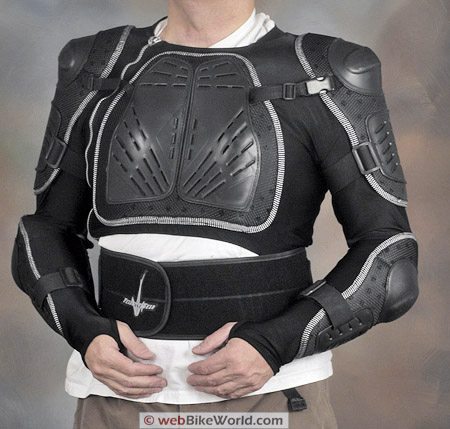
Protection and Standards
I wonder if the confusing standards and terminology have actually reduced the number of approved motorcycle protection that is available for sale, because consumers won’t understand the differences.
One thing’s for sure though — there’s a lot of the protection that is sold meets no international safety standards at all.
And some motorcycle clothing companies make unsubstantiated claims for the protection they’re selling, or claim that their armor “meets or exceeds the safety standards”, standards that the company invented for themselves.
Of course, there’s the argument that any protection, whether it meets a standard or not, is better than none.
But as with motorcycle helmets, it makes sense to look for products that meet the international safety standards, especially if those products have been certified by approved testing facilities.
By the way, we’ve also discovered that some protectors are “one time use”; that is, once it’s saved your bacon, it’s done.
This may or may not be a problem, as long as it works. If a back protector saved your life, you may be happy to hang it on a wall as a trophy and buy another.
Velocity Gear says that all of their armor meets the standards.
Their back protectors, including the one on the Juggernaut, is CE EN1621-2 Level 2 compliant, and it “exceeds Level 2 requirements” because it transmits 4.49 kN, much lower than the maximum 9 kN called for in the standard.
The Juggernaut motorcycle protector shirt was tested and certified by SATRA UK, which is an organization roughly comparable to Underwriter’s Laboratories in the U.S.A.
The Juggernaut meets CE EN1621-2:2003 Level 2 for back protection and CE EN1621-1:1998 for shoulder and elbow protection.
Sounds impressive, but even the best protection in the world will protect no one if it isn’t being worn because it doesn’t fit or isn’t comfortable.
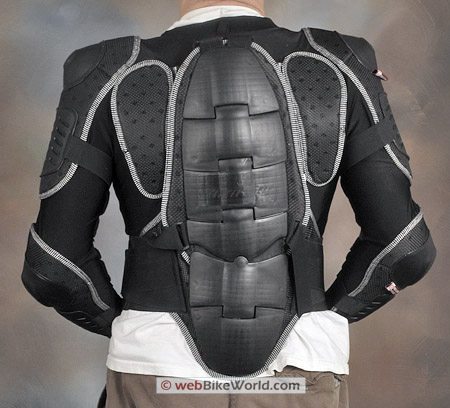
The Juggernaut
Fortunately, that isn’t the case with the Juggernaut.
You may be wondering how anything that makes one look like a close relative of SpongeBob’s boss, Mr. Krabs, could possibly be comfortable to wear.
I thought the same, but maybe it’s the Astrosorb-backed plates (more on this in a minute) or the supple Lycra fabric in the shirt, but this thing is way more comfortable than it should be and, I think, more comfy than the original that we reviewed previously.
Surely the Lycra plays a role, because it feels good while holding the armor in place.
Fitting Protectors
Correctly located protection is one of the keys to comfort. I’ve been having problems lately finding off-the-rack motorcycle clothing that fits correctly; the jackets and pants are either too tight or too loose.
They should be just tight enough to hold the protectors close to the body, where it will stay put if and when it’s needed and not get in the way during a ride.
If the protection moves freely around when pushed with a hand from outside the jacket, it’s probably not going to stay in place in a crash.
I’ve pretty much given up on finding a pair of motorcycle pants that fits and has correctly located armor in the knees and hips. I can usually find either a good fit or correct armor placement but not both, for some reason.
My strategy lately is to find pants that come as close as possible to a correct fit and then I pull out the protectors and wear armored underwear underneath.
I have discovered that wearing it can help with the fit, because it gives the pants some freedom to slide over the underwear in a way that built-in protectors can’t.
The bonus is that the protection in the underwear stays where it belongs. I’m using the Juggernaut the same way, by wearing it under my favorite jackets with the protectors removed.
This has increased the range of pants and jackets that will fit me, because I don’t have to worry as much about the quality or location of protectors in the apparel, knowing that I can be fully protected with probably more and better protectors that will stay in place, with less regard to the size.
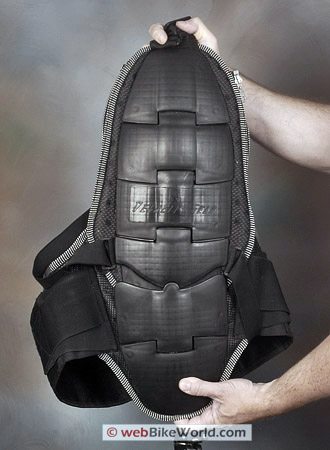
Juggernaut Details
The Juggernaut can also be considered a dual-use apparel item, because the back protector can be removed from the shirt and used by itself if desired.
It’s a fully functional, Level 2 articulated back protector that seems about as good as any others.
I’ve seen solo back protectors that cost nearly as much as the Juggernaut, so it’s a two-for-one.
The back protector uses elastic connectors to allow it to bend forward with the rider’s back, but the shape of the armor “plates” is such that it can’t bend backwards.
There’s a hinge just above the lower two plates of the back protector, which allows that lower section to move side-to-side, just like the protector on the original armor shirt. This provides some freedom of movement, which is welcome.
The waist belt is also attached to the lower section, so in effect the lower section stays put while the entire upper section swings side-to-side with the rider’s movements.
You can see in the photo above that my spine and back are naturally crooked, but you’ll also notice that the back protector is flexible enough to conform to my odd shape.
The Juggernaut’s back protector has adjustable shoulder straps, but when I’m wearing it attached to the shirt (which is all the time), I place the belt over the shoulder straps, locating them between my back and the inside of the protector to keep them out of the way.
The adjustable belt on the back protector just fits around my 36″ waist, so I think it could probably use about 2 to 3 more inches of adjustment for riders whose belts are a bit longer than mine.
The Juggernaut has adjustable straps at the upper chest, between the permanently attached chest armor and shoulder armor, but like the original version, I’m not really sure how useful these are.
The adjustable forearm straps do hold the elbow armor in place though, and the adjustable upper arm straps help to locate the shoulder armor, so these are more critical as far as I can tell.
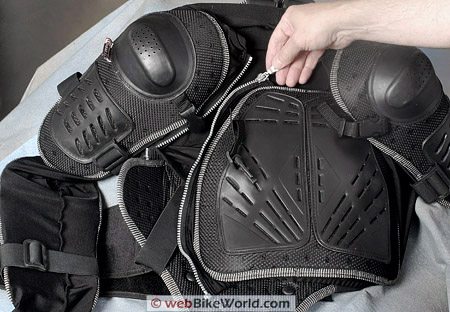
Wearing Protection
By the way, most motorcycle jackets come with shoulder and elbow protectors and maybe a squishy pad in the back.
Serious riders wear a dedicated back protector, but one of the benefits of wearing an armored shirt like the Juggernaut is that in addition to the robust shoulder, elbow, forearm and back protectors, there’s an additional plate over the chest (photo above).
The Lycra sleeves on the Juggernaut shirt now include a thumb hole at the end near the cuffs, which, when used, helps to keep the sleeves in place when the rider is putting on a jacket.
The thumb holes are also designed to help to keep the elbow protectors correctly located, so it’s a good idea to use them.
So what’s the difference between the Juggernaut and the original Velocity Armor shirt? It’s difficult to tell, because the products look very similar.
Probably the biggest difference is the surface area covered by protectors — Velocity Gear claims that the Juggernaut has 30% more coverage in the shoulders and elbows than the original.
Astrosorb?
Also, the padding behind the hard protectors on the shoulders, elbows and chest is now made from 10 mm thick “Astrosorb”, which is becoming a popular form of energy-absorbing material used in motorcycle protective apparel.
Velocity Gear claims that 10 mm Astrosorb reduces the amount of energy transmitted by about half the maximum CE standards for protection in the shoulders, elbows and chest.
It also seems more flexible than other types of energy-absorbing padding, which, as we noted, adds to the comfort level.
Velocity Gear says that Astrosorb “at this thickness has been shown to Outperform EN1621-1 by achieving a shock absorption value of 90 Joules at only 10mm”. I guess that’s good?
The EN1621-1:1997 requirement (shoulder, elbow and knee protectors) states that limb protectors “should transmit no greater than 35kN of transmitted force following a given impact energy of 50 joules”.
And since 10mm of Astrosorb “transmits no more than 35kN from an impact energy of 90 Joules”, the parts of the protector using Astrosorb transmit less than half the current standard.
The folks at Forcefield Armor (see our review) probably have a different of opinion regarding the efficacy of Astrosorb when compared to their own material.
And although Forcefield armor is no doubt good stuff, our experience tells us that it’s not as flexible when worn under motorcycle clothing and it’s heavier, making it less comfortable.
And just for the record, we’ll repeat what Burn said in his review of the original Velocity Gear protectors: back protectors and other forms of motorcycle armor are hot in the summer.
“There’s just no getting around it”, he wrote, “the plastic or padding used in this type of armor is hot, no matter how perforated it might be (and it usually isn’t). In weather like we’ve had around here recently, anything other than the lightest mesh seems too hot for comfort.”
ADDENDUM: Sizing I forgot to mention sizing. The Juggernaut is available in sizes ranging from XS to XXXL. I normally take a size large street jacket or shirt, but Velocity Gear sent me a size medium Juggernaut after I gave them my measurements.
But if I followed the list of chest sizes in the drop-down size choice menu on the Juggernaut ordering page, I would have ordered a size XL.
So an email or call to Velocity Gear with your chest size might be a good idea prior to placing an order.
Conclusion
The Juggernaut armored shirt is only $10.00 more than the original, so it’s still a bargain, especially considering the Level 2 compliance for the back protector.
I think it’s even more comfortable that the original, possibly due to the Astrosorb padding behind the hard armor.
The older I get, the more concerned I become about safety, and I’m convinced that the Juggernaut shirt offers about the best protection I can get for the money.
It fits comfortably, it meets the best current standards for motorcycle safety gear and it works well underneath all of my favorite jackets.
That it’s a two-for-one with a removable back protector just sweetens the deal.
More webBikeWorld:
| wBW Review: Velocity Gear Juggernaut Shirt | |
|---|---|
| Manufacturer: Velocity Gear | List Price (2007): $179.00 |
| Colors: Black | Made In: Unknown |
| Sizes: XS-3XL | Review Date: July 2007 |
Note: Item provided by a retailer, distributor or manufacturer with these Terms and Conditions.
Owner Comments and Feedback
See details on submitting comments.
From “A.D.” (7/10): “I’ve had a Velocity Juggernaut for six weeks now and I’d like to comment.
When I first got it the chest pad seemed to ride rather high. This was a literal pain in the neck, because when on the bike the upper edge of the belly band would push the chest plate up into my Adam’s Apple.
Turns out this was my fault, for not wearing it properly. There are no instructions on proper wear included with the product, and I was basing how I should wear in on the photo in your review.
This shows the upper edge of the belly band below the chest plate and the lower edge of the belly band at the rider’s waist. The photos at the Velocity site suggest a similar fit, though they do not show the person wearing it.
The model in your photo must be a very tall, long-waisted guy.
Wearing it that way didn’t work for me (I’m 5’7”). If I put the lower edge of the band at my waist and the upper edge of the band below the chest plate, the upper edge of the plate would be at my throat, instead of at my clavicle.
For a while I put the belly band OVER the plate so I could keep its lower edge at my waistline, and that worked but didn’t seem correct.
The back protector felt like it was too high and it just felt kind of awkward.
Emails to Velocity told me that I wasn’t doing it right. You put the shirt on, zip it up and pull the belly band DOWN as you fasten it, stretching the shirt’s Lycra.
There is no need to put the lower edge of the band at your waist, and the chest plate can go over the band. There are even a couple of Velcro tabs on the chest plate that you can stick to the band to keep it from riding up.
On me, the middle of the band winds up at my waist.
That’s a good two or three inches lower than I had been wearing it when I had the band up over the plate. Now that I’m wearing it right it’s more comfortable and feels very secure.
Regarding heat, with a mesh jacket I’ve been reasonably comfy even in high heat and humidity (heat index near 100), though I wouldn’t say “cool” by any stretch of the imagination in those conditions.
With temps in the upper 80s and reasonable humidity I’m quite comfortable. Most of the shirt is open-weave Lycra that you can see through, so it doesn’t impede air flow at all.
The vent holes in the chest plate don’t seem to do anything. However, there’s noticeable air flow down the inside of the chest plate, which is quite pleasant.
The air comes in through the neck of my jacket and flows down over my chest. If I flex my torso a bit I can get even more room, and feel the air on my belly – er, “abs” (they’re in there somewhere, right?”
From “G.P.” (2/10): “I just bought a Juggernaut armored shirt and Prodigy gloves on the strength of your reviews. I have never seen such outstanding quality for the price.
As an extra benefit, the Juggernaut makes my helmet very quiet. I think this is because the tall shoulder pads reduce wind turbulence at the base of my helmet. I am not sure if the hump created by the back protector is also a factor.
I use the Windjammer on my Arai Profile, but the Juggernaut has made a huge difference. I have a Kawa ZX14 and the noise reduction is very noticeable at medium to high speeds.
Thanks for your great website.”
From “J.P.”: “I just wanted to give you my take on the new Juggernaut model versus the old model. I’ve now had both.
I sent the original back immediately when the Juggernaut was available because the original had a problem with the zipper for the back protector attachment. The original had standard zippers.
I started to notice after a ride that the zipper would come loose. Eventually, the zipper just gave way and the shirt was pretty much useless.
The Juggernaut has heavy duty zippers and the problem is solved. Be weary of similar armored shirt that have a standard zipper setup. It will not last long. Heavy duty zippers are the way to go.
I’ve tried various outer garments to wear over the shirt and nothing seems to work. Not even a football jersey fits right, so I just wear it by itself and wear the back protector separately under my leathers for track.”
From “D.L.”: “I cannot be sure if your remarks within the Juggernaut armor review were tongue in cheek or not, but I’d chime in (being an engineer). A Newton is a kg-m/s^2. . . narrows it right down, eh? A Joule is a N-m.
To make sense of this whole thing:
A Joule is .74 ft-lb and a Newton .224 pounds (Newton and pound both being measures of force).
The testing methodology should describe what level of force is applied, over what area and what time. . . that is what gives the results context.
So, yes, confusing indeed, but there at least is a conversion to more common units.”


